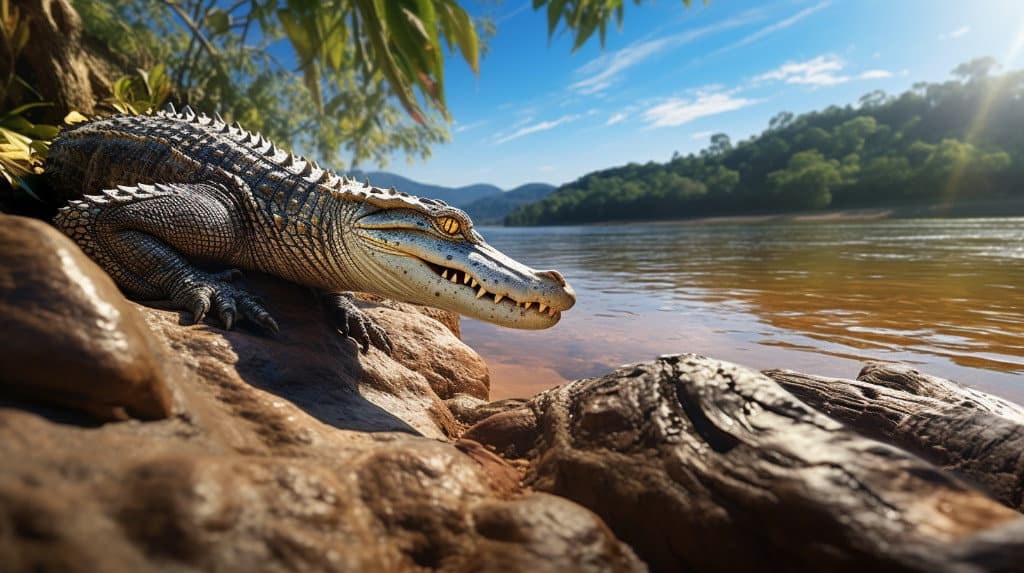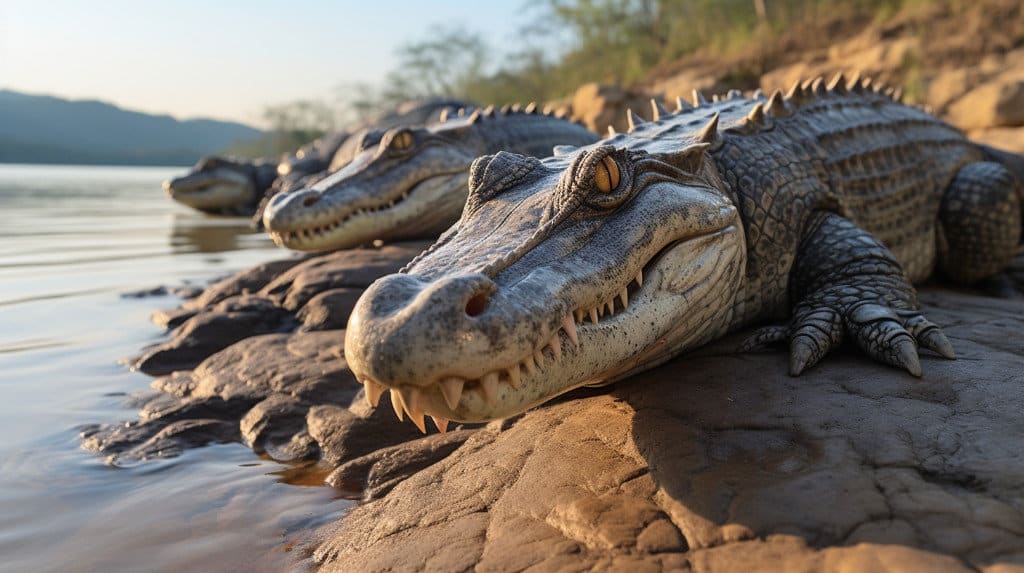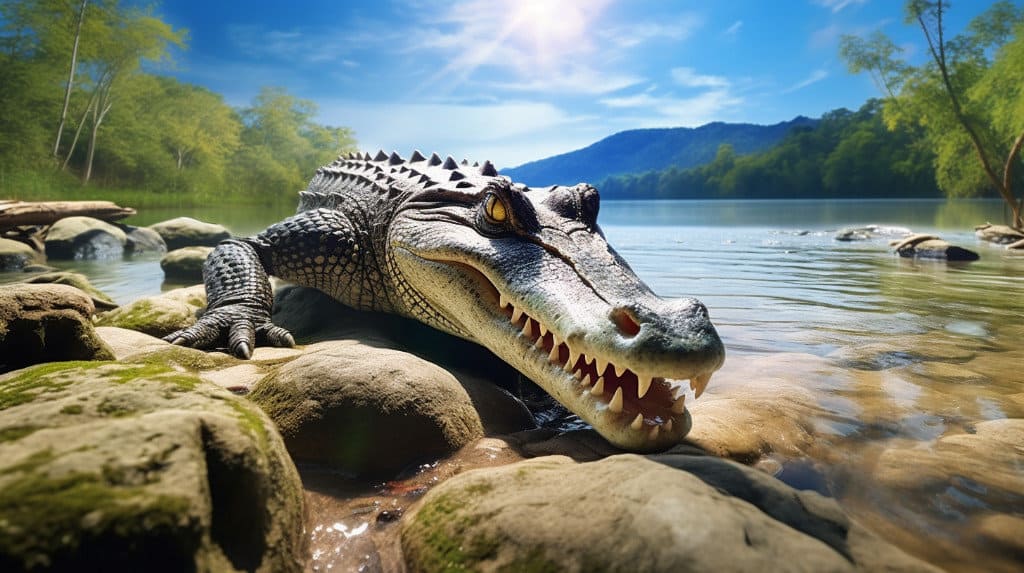Introduction:
Hippos and crocodiles are two of the most fascinating creatures in the animal kingdom. While they may seem like unlikely adversaries, there have been instances where hippos have been known to eat crocodiles. This may come as a surprise, considering the reputation crocodiles have as fierce predators. However, hippos are incredibly powerful and territorial animals, and when provoked or threatened, they can display aggressive behavior towards any potential threat, including crocodiles.
Key Takeaways:
| Fact | Description |
|---|---|
| 1. | Hippos are herbivores, but they can become carnivorous when necessary. |
| 2. | Crocodiles are opportunistic predators, and they often prey on smaller animals. |
| 3. | Hippos have been observed attacking and killing crocodiles in territorial disputes. |
| 4. | These encounters between hippos and crocodiles are relatively rare but have been documented. |
| 5. | The size and strength of hippos make them formidable opponents for crocodiles. |
Understanding Hippos and Crocodiles: An Overview

Hippos and crocodiles are fascinating creatures that inhabit the rivers and waterways of Africa. These two species play important roles in the African wildlife and contribute to the delicate balance of the river ecosystem. In this overview, we will explore some basic facts about hippos and crocodiles, their behaviors, and their interactions with each other and their environment.
Basic Facts about Hippos
Hippos, scientifically known as Hippopotamus amphibius, are large semi-aquatic mammals native to sub-Saharan Africa. They are known for their massive size and powerful jaws. Despite their herbivorous diet, hippos are considered one of the most dangerous animals in Africa due to their aggressive nature and territorial behavior.
Hippo Diet: Contrary to popular belief, hippos are herbivores. They mainly feed on grass and aquatic plants. Their diet consists of large quantities of vegetation, which they consume during the night.
Hippopotamus Behavior: Hippos are known for their semi-aquatic lifestyle. They spend most of their time in water to keep their bodies cool and protected from the sun. Hippos are also excellent swimmers and can hold their breath for several minutes.
Hippo-Crocodile Interactions: Hippos and crocodiles often share the same habitat, leading to occasional interactions. While hippos are known to be aggressive towards other animals, including crocodiles, the two species generally avoid direct confrontations. However, there have been instances where hippos have attacked and killed crocodiles that ventured too close.
Basic Facts about Crocodiles
Crocodiles, belonging to the order Crocodylia, are large reptiles found in tropical regions of Africa, Asia, Australia, and the Americas. They are well-adapted to aquatic environments and are known for their powerful jaws and sharp teeth.
Crocodile Prey: Crocodiles are apex predators and have a diverse diet. They primarily feed on fish, birds, and mammals that come near the water’s edge. Crocodiles are opportunistic hunters and can ambush their prey with lightning-fast strikes.
Crocodile Defense Mechanisms: Crocodiles have evolved various defense mechanisms to protect themselves. Their tough, scaly skin acts as armor, providing protection against potential threats. Additionally, crocodiles have strong jaws and sharp teeth, capable of inflicting serious injuries.
Crocodile Survival: Crocodiles have been around for millions of years and have survived through various environmental changes. Their ability to adapt to different habitats and their efficient hunting techniques have contributed to their long-term survival.
In conclusion, hippos and crocodiles are fascinating creatures that play important roles in the African wildlife and river ecosystems. Understanding their behaviors, interactions, and unique adaptations helps us appreciate the complexity and diversity of the natural world.
The Diet of Hippos
Hippos, also known as hippopotamuses, are fascinating creatures that inhabit the rivers and lakes of Africa. These massive herbivores have a unique diet that plays a crucial role in their survival and the overall balance of the river ecosystem.
What Do Hippos Generally Eat?
Contrary to popular belief, hippos are not carnivorous predators. In fact, they are herbivores and primarily feed on aquatic vegetation. Their diet mainly consists of grass, reeds, and other plants that grow in or near the water. Hippos are known to consume large quantities of vegetation, with an adult hippo consuming around 80 pounds of food per day.
One interesting aspect of hippo feeding habits is their ability to graze both on land and underwater. They have adapted to their semi-aquatic lifestyle by developing specialized teeth and jaws that allow them to efficiently chew and process their plant-based diet. Despite their massive size, hippos have surprisingly sharp incisors and canines that aid in biting off vegetation.
Debunking Myths: Do Hippos Eat Crocodiles or Alligators?
There is a common misconception that hippos are aggressive predators that feed on crocodiles or alligators. While hippos are indeed territorial and can be aggressive, they are not known to actively hunt or prey upon these reptiles. The idea of hippos devouring crocodiles or alligators is more of a myth than reality.
It is true that hippos and crocodiles share the same habitat, and occasionally, conflicts may arise between the two species. However, these interactions are usually a result of territorial disputes rather than predatory behavior. Hippos are known to defend their territory fiercely, especially during the breeding season, and may engage in aggressive encounters with crocodiles to protect their young.
Crocodiles, on the other hand, have their own survival mechanisms and are well-equipped to defend themselves against potential threats. They have powerful jaws and sharp teeth that can inflict serious injuries on any animal that tries to attack them, including hippos. Therefore, it is unlikely for hippos to prey on crocodiles or alligators as a part of their regular diet.
The Hippo-Crocodile Relationship
The relationship between hippos and crocodiles is more complex than simply being predator and prey. In some cases, they coexist peacefully, with each species respecting the other’s space and avoiding unnecessary conflicts. This coexistence is a testament to the intricate balance of the African wildlife and the predator-prey relationships that exist within it.
In summary, hippos have a herbivorous diet, primarily consisting of aquatic vegetation. They are not known to eat crocodiles or alligators, despite occasional territorial disputes. Understanding the feeding habits and behaviors of these magnificent creatures helps us appreciate the diverse and fascinating wildlife found in Africa’s river ecosystems.
The Relationship between Hippos and Crocodiles

Why Hippos and Crocodiles are Often Found Together
Hippos and crocodiles are two iconic species that are frequently found together in the rivers and waterways of Africa. This coexistence is not a coincidence, but rather a result of their shared habitat and the dynamics of the river ecosystem.
One of the main reasons why hippos and crocodiles are often found together is their overlapping diets. Hippos are herbivores and primarily feed on grass, while crocodiles are carnivores and prey on a variety of animals. This difference in diet reduces competition between the two species, allowing them to coexist in the same ecosystem without directly competing for food.
Another factor that contributes to their coexistence is the behavior of hippos and crocodiles. Hippos are known for their aggressive nature and territorial behavior, especially when it comes to protecting their young. Crocodiles, on the other hand, have developed defense mechanisms to avoid conflicts with hippos. They often stay submerged in the water or keep a safe distance from the territorial hippos, minimizing the chances of confrontation.
Additionally, the river ecosystem provides a suitable habitat for both hippos and crocodiles. The presence of abundant aquatic food sources attracts both species to the same areas. Hippos graze on the riverbanks during the night and return to the water during the day, while crocodiles patiently wait in the water for potential prey. This creates a balance in the ecosystem, where each species plays a vital role in maintaining the overall biodiversity.
Instances of Hippos Killing Crocodiles: Reasons and Scenarios
While hippos and crocodiles generally coexist peacefully, there are instances where hippos have been known to kill crocodiles. These situations usually occur when there is a perceived threat to the hippos or their young.
Hippos are incredibly powerful animals, and their bite force is one of the strongest in the animal kingdom. With their large, sharp teeth, they can easily inflict serious injuries on crocodiles. In fact, studies have shown that a hippo’s bite can exert a force of up to 1,800 pounds per square inch (psi), which is more than enough to crush a crocodile’s skull.
One reason why hippos may attack crocodiles is to protect their territory or young. Hippos are highly territorial and will aggressively defend their space from any potential threats. If a crocodile encroaches on a hippo’s territory or poses a danger to their young, the hippo may respond with aggression and attack the crocodile.
Another scenario where hippos may kill crocodiles is during times of resource scarcity. In periods of drought or when food sources are limited, competition for resources intensifies. In such situations, hippos may view crocodiles as potential competitors for food and may resort to aggression to eliminate the perceived threat.
It is important to note that instances of hippos killing crocodiles are relatively rare and occur under specific circumstances. The coexistence of these two species in the African wildlife is generally peaceful, with each species playing a unique role in the river ecosystem.
In conclusion, the relationship between hippos and crocodiles is a fascinating example of predator-prey dynamics and coexistence in the animal kingdom. Despite their differences in diet and behavior, these two species have found a way to share the same habitat and thrive in the river ecosystems of Africa. Their interactions serve as a reminder of the complex and interconnected nature of wildlife in Africa.
The Predatory Behavior of Crocodiles

Crocodiles are known for their predatory behavior and their position at the top of the food chain in the river ecosystems of Africa. They are formidable hunters with a reputation for being stealthy and powerful. Let’s explore two aspects of their predatory behavior: what they generally eat and instances of crocodiles attacking hippos.
What Do Crocodiles Generally Eat?
Crocodiles have a diverse diet that includes a wide range of prey. They are opportunistic feeders and will consume almost anything that comes their way. Some of the common prey items for crocodiles include fish, birds, turtles, and small mammals. They are also known to feed on larger animals such as deer and zebras when the opportunity arises.
Crocodiles are well-adapted to their aquatic lifestyle, and their diet reflects this. They are excellent swimmers and can catch fish with their powerful jaws and sharp teeth. They often lie in wait near the water’s edge, patiently observing their surroundings for potential prey. When an unsuspecting animal comes close enough, the crocodile strikes with lightning speed, using its strong bite force to secure its meal.
Instances of Crocodiles Attacking Hippos: Circumstances and Outcomes
One of the most fascinating aspects of crocodile behavior is their interaction with hippos. While hippos are known for their aggressive nature and powerful jaws, crocodiles have been observed attacking them under certain circumstances. These interactions provide insights into the complex predator-prey relationships in the African wildlife.
Contrary to popular belief, crocodiles do not typically prey on adult hippos. Adult hippos are large and formidable, capable of defending themselves against most predators. However, there have been instances where crocodiles have targeted young or injured hippos that are more vulnerable.
When a crocodile attempts to attack a hippo, it often aims for the softer areas of the body, such as the legs or underbelly. Crocodiles have incredibly strong jaws, capable of exerting tremendous bite force. It is estimated that a crocodile’s bite can reach up to 5,000 pounds per square inch (psi), which is significantly more powerful than that of a lion or a hippo.
Despite their powerful bite, crocodiles face significant challenges when attacking hippos. Hippos have thick skin and a layer of fat that provides them with some protection against crocodile bites. Additionally, hippos are known for their aggressive behavior and can use their massive size and sharp teeth to defend themselves. These factors make it difficult for crocodiles to successfully prey on adult hippos.
In conclusion, the predatory behavior of crocodiles is a fascinating aspect of the African wildlife. While they have a diverse diet and can prey on a variety of animals, instances of crocodiles attacking adult hippos are relatively rare. Understanding the dynamics of predator-prey relationships and the coexistence of different species in the wild helps us appreciate the complexity of the natural world.
Comparing Hippos and Crocodiles: Speed, Strength, and Survival
Hippos and crocodiles are two fascinating creatures that inhabit the rivers and lakes of Africa. They both have unique characteristics that contribute to their survival in the wild. In this article, we will explore the speed, strength, and survival strategies of hippos and crocodiles.
Are Hippos Faster than Crocodiles?
When it comes to speed, hippos may not be the fastest animals in the animal kingdom, but they can still move surprisingly quickly for their size. On land, hippos can reach speeds of up to 20 miles per hour (32 kilometers per hour). However, in the water, they are much more agile and can swim at speeds of around 8 miles per hour (13 kilometers per hour). This allows them to navigate through the water with ease and escape potential threats.
On the other hand, crocodiles are known for their impressive speed in the water. They can swim at speeds of up to 20 miles per hour (32 kilometers per hour), making them formidable predators in aquatic environments. Their streamlined bodies and powerful tails enable them to swiftly move through the water, making it difficult for their prey to escape.
Can a Hippo Kill a Crocodile?
When it comes to strength, both hippos and crocodiles possess incredible power in their own ways. Hippos are known for their massive size and strong jaws. They have large, sharp teeth that can easily crush bones and tear through vegetation. Despite their herbivorous diet, hippos are known to be highly territorial and can become aggressive if they feel threatened. In fact, hippos are responsible for more human deaths in Africa than any other large animal.
Crocodiles, on the other hand, are known for their powerful bite force. With their sharp teeth and strong jaws, they can easily overpower their prey. A crocodile’s bite can exert a force of up to 5,000 pounds per square inch (psi), which is stronger than any other animal in the world. This immense bite force allows them to capture and devour their prey, which can include hippos themselves.
Survival Strategies: How Hippos and Crocodiles Coexist
Despite their potential as predators, hippos and crocodiles have found a way to coexist in their shared habitats. They both play important roles in the river ecosystem and have adapted their behaviors to minimize conflicts.
Hippos are herbivores and primarily feed on grass. They spend most of their time in the water to keep cool and protect their sensitive skin from the sun. This behavior reduces their chances of encountering crocodiles, as crocodiles are more active during the day and tend to stay closer to the water’s edge.
Crocodiles, on the other hand, have developed defense mechanisms to avoid conflicts with hippos. They are known to be opportunistic predators and will target smaller prey that is easier to catch. This reduces the chances of direct confrontations with hippos, as they are much larger and more powerful.
In conclusion, hippos and crocodiles are fascinating creatures with unique characteristics that contribute to their survival in the wild. While hippos may not be as fast as crocodiles, they make up for it with their size and powerful jaws. Both species have adapted their behaviors to coexist in their shared habitats, ensuring the balance of the river ecosystem in Africa.
Conclusion
In conclusion, while it is true that hippos are known to be herbivores, there have been instances where they have been observed attacking and even killing crocodiles. These encounters are rare and usually occur when the hippos feel threatened or when they are protecting their territory or young ones. Despite their primarily herbivorous diet, hippos have incredibly powerful jaws and can inflict serious damage on crocodiles. However, it is important to note that such interactions are not the norm and most of the time, hippos and crocodiles coexist peacefully in their respective habitats.
Frequently Asked Questions
Q1: Does hippos eat alligators?
No, hippos do not eat alligators. Hippos are primarily herbivores, meaning their diet mostly consists of grasses. However, they are known to be highly aggressive and can kill or injure alligators if they feel threatened.
Q2: Why don’t crocodiles eat hippos?
Crocodiles generally do not eat hippos because of their size and strength. Hippos are one of the most aggressive animals in the world and can easily defend themselves against crocodiles. In fact, crocodiles often avoid adult hippos in the wild.
Q3: Do hippos eat saltwater crocodiles?
No, hippos do not eat saltwater crocodiles. While they are highly aggressive, their diet is primarily herbivorous. The interactions between hippos and crocodiles usually involve territorial disputes rather than food.
Q4: Are hippos faster than crocodiles?
Yes, on land hippos are faster than crocodiles. Hippos can reach speeds of up to 30 km/h while crocodiles can only reach around 12-14 km/h. However, in water, crocodiles are faster swimmers.
Q5: Can crocodiles eat hippopotamus?
While crocodiles are carnivorous and can eat a wide range of prey, they generally do not attack full-grown hippos due to their size and aggressive nature. However, they might prey on young or weak hippos if the opportunity arises.
Q6: Can hippo kill a crocodile?
Yes, a hippo can kill a crocodile. Hippos are extremely powerful and aggressive, and are known to kill crocodiles when they feel threatened or when defending their territory.
Q7: Why do hippos kill crocodiles?
Hippos may kill crocodiles as a result of territorial disputes or to protect their calves. Despite not being carnivorous, hippos are one of the most dangerous animals in Africa due to their aggressive behavior.
Q8: Do crocodiles eat baby hippos?
Yes, crocodiles can and do eat baby hippos. Crocodiles are opportunistic predators and will take advantage of vulnerable prey. However, mother hippos are highly protective and will fiercely defend their offspring.
Q9: How do hippos kill crocodiles?
Hippos kill crocodiles using their powerful jaws which can exert a pressure of up to 2000 pounds per square inch. They can crush a crocodile’s body or head, leading to fatal injuries.
Q10: Why do hippos hate crocodiles?
While it’s not accurate to say that hippos ‘hate’ crocodiles, conflicts do occur. These are usually related to territorial disputes or when a crocodile gets too close to a hippo calf. Despite these occasional conflicts, hippos and crocodiles often coexist peacefully in the same habitats.




